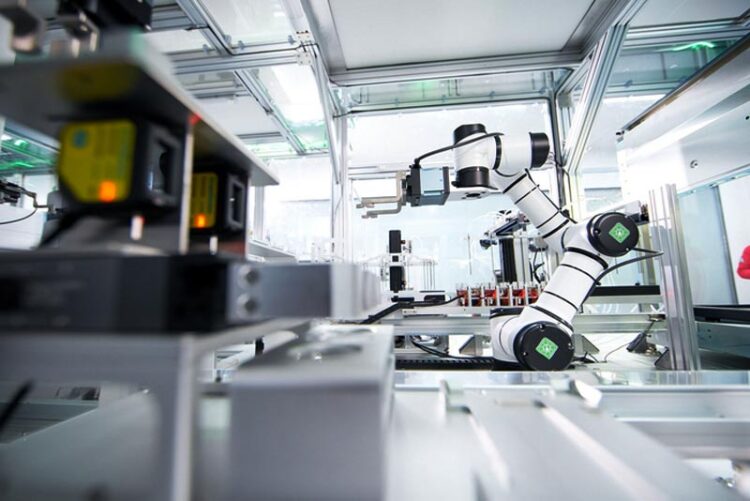6th generation Intelligent Robotics Lab to further accelerate its AI-driven drug discovery

The 6th generation AI-run autonomous lab launched in late December in Suzhou, China.
Credit: Insilico Medicine
Insilico Medicine (“Insilico”), a clinical stage, end-to-end artificial intelligence (AI)-driven drug discovery company, held the launch ceremony for Life Star – a 6th generation Intelligent Robotics Drug Discovery Laboratory – in Suzhou BioBAY Industrial Park on Dec. 29.
The fully automated AI-powered robotics laboratory performs target discovery, compound screening, precision medicine development, and translational research. The lab will allow Insilico to further accelerate its end-to-end drug discovery and optimize the success rate of its drug development as it moves its novel therapeutics through clinical trials.
High-throughput screening, automatic modules, and machine learning data generation are not new in the biomedical sector. To date, 5th generation robotics laboratories have realized full automation with no human bias or influence, connected multiple processes, and generated high-quality data that can be used for machine learning. Insilico Medicine’s lab takes this process one step further to incorporate AI in decision-making and deeply integrate AI with automation, robotics, and biological capabilities to enable a new generation of intelligent robotic labs.
“We hope to usher in a new era of biology labs,” said Alex Zhavoronkov, PhD, founder and CEO of Insilico Medicine. “Insilico’s robotics lab has an AI brain, an automated machine body, and the limbs of various complex robots. The AI brain has been trained and verified through Insilico projects and has learned from years of experience collaborating with global pharmaceutical companies. It can carry out systematic learning based on the information provided, and assist in the decision-making of target discovery and identification. In the Intelligent Robotics Lab, the AI brain will propose potential targets and design automated experiments and workflows based on experimental results.”
The Intelligent Robotics Lab forms a closed loop by combining Pharma.AI (Insilico Medicine’s end-to-end AI platform for target discovery, novel drug design, and clinical trial prediction) with fully automated biological experiment functional modules.
Specifically, after the Pharma.AI target discovery platform PandaOmics predicts novel targets for specific diseases, the robotics lab will conduct early-stage drug discovery experiments like target validation, high-throughput hit compound screening, hit-to-lead optimization, lead-to-preclinical candidate (PCC) confirmation, and translational research. These biological experiments that are traditionally conducted by humans will be achieved through six fully automated modules including sample management and quality control, compound management, automated cell culture, high-throughput screening, high-content cell imaging, and next-generation sequencing. All the high-quality data generated by the robotics lab will complement and expand Insilico’s existing data resources to train and optimize the AI platform, further strengthening Insilico’s biological data factory.
Feng Ren, PhD, Chief Scientific Officer and co-CEO of Insilico Medicine, said, “Target identification is the source of new drug development. One of the major challenges currently faced by the biomedical industry is finding the right target. Now, Insilico Medicine proposes a comprehensive solution through the Intelligent Robotics Lab. First, the lab helps to identify and verify potential targets efficiently. It then evaluates and analyzes the activity and druggability of the compounds designed. In addition, it helps discover biomarkers and conduct studies on the mechanism of action during preclinical and translational research. The Robotics Lab has begun working on Insilico projects and we look forward to providing this tool to advance the research of our academic and business partners.”
Founded in 2014, Insilico Medicine is one of the first players in AI-driven drug discovery. It has built a powerful and efficient end-to-end AI platform, Pharma.AI, to improve the speed, cost, and efficiency of drug discovery. Since 2021, Insilico has advanced 9 preclinical candidates, including drug candidates with novel targets and structures discovered by AI, and drug candidates with desirable properties designed by AI aiming at known targets. Projects are widely spread across multiple disease areas including fibrosis, immuno-oncology, inflammation, and COVID-19.
About Insilico Medicine
Insilico Medicine, a clinical stage end-to-end artificial intelligence (AI)-driven drug discovery company, is connecting biology, chemistry, and clinical trials analysis using next-generation AI systems. The company has developed AI platforms that utilize deep generative models, reinforcement learning, transformers, and other modern machine learning techniques to discover novel targets and to design novel molecular structures with desired properties. Insilico Medicine is delivering breakthrough solutions to discover and develop innovative drugs for cancer, fibrosis, immunity, central nervous system diseases and aging-related diseases. Headquartered in Hong Kong, Insilico Medicine has additional offices in New York, Montreal, Shanghai, Suzhou, Taipei, and Abu Dhabi. www.insilico.com
For media inquiries, please contact media@insilicomedicine.com
For business development, please contact bd@insilicomedicine.com
Media Contact
Margaretta Colangelo
Insilico Medicine
media@insilico.com
Cell: 415-686-2539
@InsilicoMeds
All latest news from the category: Medical Engineering
The development of medical equipment, products and technical procedures is characterized by high research and development costs in a variety of fields related to the study of human medicine.
innovations-report provides informative and stimulating reports and articles on topics ranging from imaging processes, cell and tissue techniques, optical techniques, implants, orthopedic aids, clinical and medical office equipment, dialysis systems and x-ray/radiation monitoring devices to endoscopy, ultrasound, surgical techniques, and dental materials.
Newest articles

First-of-its-kind study uses remote sensing to monitor plastic debris in rivers and lakes
Remote sensing creates a cost-effective solution to monitoring plastic pollution. A first-of-its-kind study from researchers at the University of Minnesota Twin Cities shows how remote sensing can help monitor and…

Laser-based artificial neuron mimics nerve cell functions at lightning speed
With a processing speed a billion times faster than nature, chip-based laser neuron could help advance AI tasks such as pattern recognition and sequence prediction. Researchers have developed a laser-based…

Optimising the processing of plastic waste
Just one look in the yellow bin reveals a colourful jumble of different types of plastic. However, the purer and more uniform plastic waste is, the easier it is to…



